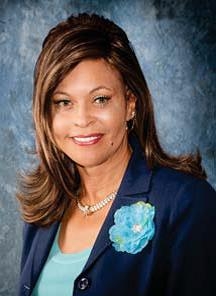You have /5 articles left.
Sign up for a free account or log in.

Gloria Fisher
San Bernardino Valley College
A California community college president without a bachelor’s degree is facing scrutiny from higher education regulators.
San Bernardino Valley College President Gloria Fisher, a longtime employee of the college, received her law degree from a school that lacks American Bar Association approval. She received that law degree without ever earning an undergraduate degree.
Fisher’s educational background, or lack thereof, has drawn scrutiny over the years from professors. Now, the college’s accrediting agency, the Accrediting Commission for Community and Junior Colleges, has taken an interest because it requires presidents to have at least a master’s degree from an accredited college.
The solution? Fisher plans to earn a master’s degree while still serving as president of San Bernardino Valley, a 12,000-student college in inland Southern California.
Fisher has worked at the college since 1991. She was interim president for 16 months before being named permanent president late last year. Fisher's profile on the college Web site identifies her as "Dr. Gloria Fisher."
But last week, the accrediting commission issued a warning to San Bernardino Valley that named Fisher. The warning cited a variety of issues, but also noted that Fisher’s single higher education degree did not meet its standards. The commission wants college presidents to have a master’s degree from a regionally accredited college.
Fisher received her only degree in 1986 from San Joaquin College of Law, which is not accredited by the ABA. California law schools like San Joaquin can have state accreditation, which allows their graduates to practice law in the state, but the approval is separate from regional accreditation. The school only received regional accreditation in 1993 from the Western Association of Schools and Colleges' Accrediting Commission for Senior Colleges and Universities. According to state records, Fisher also does not have a license to practice law.
A philosophy professor at San Bernardino Valley, Leonard Lopez, complained about Fisher, triggering the regulator’s scrutiny. Lopez also wrote a letter last week to faculty, staff and board members saying Fisher should resign.
Instead, the college plans to allow her to complete her master’s degree from an accredited institution while remaining on as president.
Lopez wonders about that logic. He said there is a progression of education that qualifies someone to lead a college: undergraduate degree and then graduate degree. Fisher doesn't have the first and her graduate degree's worth is in question. She may be qualified to do something and have practical experience, he said, but that doesn't alone qualify someone to lead a college.
Waiting on Fisher to get her education "irresponsibly, unreasonably and even selfishly extends the period we’re out of compliance,” Lopez said.
Fisher’s spokesman referred questions to the community college district chancellor’s office.
Bruce Baron, the chancellor of the San Bernardino Community College District, defended his decision to hire Fisher. Baron said there is 2006 legal opinion from the state community college system that says Fisher could be grandfathered into the system.
“When she graduated from that law school, they were accredited by the California Bar Association, which back at that time, under the existing regulations of the time, was a valid accrediting body," Baron said.
While Fisher is not qualified under current standards, California did not always require its administrators to have master’s degrees from regionally accredited institutions. Instead, state-accredited institutions, like San Joaquin’s law school, could count.
Baron contends that 2006 legal opinion and a 2010 court ruling on a previous complaint about Fisher gave her the all clear.
But Lopez counters that the court ruling did not address the merits of the complaint against Fisher and the law has changed since the 2006 opinion in a way that renders the advice moot. Lopez also argues the 2006 opinion talked about Fisher when she was an instructor, not college president.
Lopez is not the first professor to complain about Fisher, although California community college administrators minimize Fisher’s critics as amounting to only a few disgruntled faculty.
Baron said he is not sure why Fisher is drawing opposition.
“I don’t know why this crusade is so important to them, but obviously it is and it was, and we want to do the right thing, and we believe we are doing the right thing,” he said.
Seven years ago, another professor, Frank Peterson, sued San Bernardino Valley for employing Fisher throughout the years as a teacher, supervisor and dean even though she lacked a master’s degree or professional training before she was hired. A judge tossed the case, noting that Peterson had waited an “unreasonable” eight years before he formally complained to the court about Fisher.
Baron said he unsuccessfully argued with the accrediting commission that Fisher should be qualified. He said there is only a disagreement between California’s interpretation and the accrediting agency’s.
Barbara Beno, the president of the accrediting agency, said other colleges have failed to assure that their people have degrees from appropriately accredited institutions and each college has handled it in its own way.
She said her agency will not act again at San Bernardino Valley until next March, when the commission will look at what the college has done.
“The college may choose its own means of addressing the deficiency, so long as that solution assures that the office of the president is held by an individual with an appropriate degree,” Beno said in an e-mail.
Baron said Beno told him the accrediting commission would be O.K. with Fisher staying at the college as long as she was working to complete her degree, and that Fisher will have to complete her degree on her own time.
What’s unclear is what it would take for her to do so.
Will Fisher have to get a bachelor’s degree to get into a master’s program? If she has to, could she quickly get a bachelor’s degree based on life experience? How long will it take to get a master’s? Can she earn a master’s degree without compromising her ability to run the college and fix the other issues accreditors have with it?
“A master’s program is going to be rigorous -- at least, a nationally accredited one,” Lopez said. “There’s going to be long papers to write and long books to read and because she works here during the day, she’s going to have to take this in a night program, so there’s going to be a compromise.”
Baron said he is sticking with Fisher -- rather than hiring one of the more than 700,000 other people in the U.S. who have received an advanced degree in the past three decades -- because Fisher was hired after two unsuccessful presidential searches at San Bernardino Valley and she was, in his eyes, the best of the three finalists in the third search.
“We’re at a position where the recommendation is she earn a degree and she is willing to do, so I believe that it is important for us to stand by her,” Baron said.




